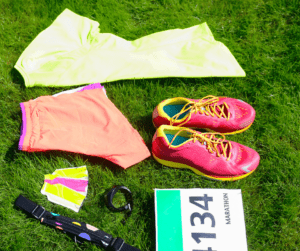If race day is in just four weeks… there are probably a couple of things going through your mind right now.
“How can it be so SOON?”
“How long before I get to taper?”
“What on earth am I meant to be doing in these four weeks?!”
The last four weeks leading into any race are the most difficult time psychologically as they are critical to the achievement of your goal. Train too much or too hard and you will line up fatigued and struggle on race day. Take your foot off the accelerator too much and you will lose fitness and gain weight. It is also during this time we are physically at our peak that our immune systems are most susceptible to infection.

So, with that said… let’s dive right into what exactly you should be doing.
What You Should Be Doing 4 Weeks Before Race Day
- Reduce your mileage
- Increase SOME intensity
- Adjust your diet
- Manage your portion size
- Maintain a low infection risk
- Get an extra hour of sleep each night
Reduce Your Mileage
A good formula to follow over the last 4 weeks, provided you have done the hard yards, is to reduce your mileage weekly by 25% in the 3rd week, then to 50% in the 2nd week, and in the last week keep the running volume very low.
Increase SOME Intensity
During this time you will also want to increase the intensity of SOME of your sessions, however, you need to base this increase relative to your ability and goal or risk injury just before the race.
Adjust Your Diet
An important consideration when tapering is that your energy demand will go down, if you do not adjust your diet accordingly you will put on a few kilograms.
Manage Portion Sizes
While some may advocate this as stored energy, excess weight is a killer for running efficiency, and particularly in shorter distances, you do not want to reduce your efficiency. Again this is a fine line; you do not want to starve yourself as this will reduce muscle mass, decrease motivation, and further impact immunity.
Follow largely the same eating plan, cutting down on energy/recovery drinks and managing portion size.
Maintain A Low Infection Risk
Ensure that you maintain as low an infection risk as possible. Where possible, avoid large gatherings where exposure to infection is increased.
Get More Sleep
Try to get an hour per night of extra sleep as this will help to boost the immune system. Increase your vitamin intake – particularly vitamin C to improve your chances of fighting off infections.

How Long Should Your Taper Be?
Tapering involves reducing the amount of running you do to be fresh for race day so that you can take full advantage of the training that you have done.
The length of a taper does depend on the volume of training done. For a half marathon, 10 days of tapering should be fine, but for a full marathon or ultra-marathon – where the training volume is a lot more, the length of the taper will be longer too.
This study found that tapering can speed up your time by 5.6%. If we look at this percent in terms of a marathon, that is the difference between a 3:20 and a 3:31!
As mentioned above, the ideal taper would be you eventually cutting down total volume by 50% by the final week, including speed workouts. It would involve you running as many days a week as you normally do, but reducing volume in everything from workouts to long runs, as well as your weekly total mileage.
This video covers tapering specifically for a half marathon, check it out:
Can You Taper Too Much?
Tapering is one of the most important parts of any training plan, but in many cases, it’s also one of the hardest to implement.
If we have a look at Peter Gilmore’s story, his tapering in the build-up to the 2006 Boston Half Marathon was so LITTLE.
It all started with the Houston Half Marathon 3 months prior…
Throughout the Houston Half Marathon Gilmore was feeling sluggish and slow… So after the 21km, he compared tapering notes with another athlete who pointed out that maybe Gilmore was changing his natural state by cutting his miles too drastically (Gilmore was cutting his miles by 55% in the lead up to the Houston Half Marathon)
So, 3 weeks leading up to Boston, Gilmore cut his weekly mileage by only 35%. (Not the usual 55%)
Boston Half Marathon results: 2:12:45. (Gilmore managed to trim 17 seconds off of his record!)
So, the point that I’m trying to make with Gilmore’s story is that, yes, you can taper too much…too fast and you can lead your body into believing it’s on “holiday”.
By not tapering slowly your body will start to feel uncomfortable, everything will shorten and tighten up and your running stride will feel troublesome. There needs to be a balance of keeping enough stress so that your body still feels like it’s in the zone.
This is why it’s so important to reduce your mileage incrementally (25% to 50%) over the four weeks.

What Are The Benefits Of Tapering Before A Race?
Based on this research study published in the Journal Medicine & Science in Sports & Exercise:
The Benefits Of Tapering:
- Reductions in training volume appear to induce positive physiological, psychological, and performance responses in highly trained athletes.
- Positive physiological and performance adaptations can be expected as a result of tapers lasting 4–28 days, yet the negative effects of complete inactivity are readily apparent in athletes.
- A realistic performance improvement of about 3%.
Now that you know how you should physically be preparing for race day, it’s important to remember that there are other race day preparations that need to take place…
How To Make Sure You’re Ready For Race Day
- Enjoy The Taper
- Fuel Up
- Don’t Overdo It
- Plan
- Make Sleep a Priority
- Set a Goal
- Hydrate
- Enjoy The Expo…But Resist The Freebie’s
- Pre Race Workout
- Running Kit Prep
- Slow Down
Enjoy The Taper
For a lot of runners, tapering can be very disconcerting. The taper is there to give your body time to freshen up, recuperate and rebuild before race day. This is the perfect time to mentally prepare for the race, so enjoy it and allow your body do what it needs to do.
Fuel Up
#1 Rule, You should not experiment with any new foods or venture too far from your normal diet. NO matter how many times your friend has recommended that brand-new energy gel!
You should however be increasing your total carbohydrate intake by adding more pasta and starches (low glycemic index foods) to your diet.
Make sure to consume a higher percentage of your total daily calories as carbohydrates, but remember that you’re not running as much as you have been, so eating more than you normally do will make you feel lethargic. (Don’t overdo it)

Don’t Overdo It
At this stage, you need to trust that you have trained properly and that you’re not going to lose your fitness by resting the day before the race.
Some people find that they benefit more from a rest day the day before the race and some people prefer to go for a slow short jog. Just remember that this is not the time to overdo things.
Plan
The nerves are going to be kicking in and you may find yourself feeling a bit frazzled. Why not create a proper plan to ensure things aren’t forgotten, missed, or miscommunicated.
Organize every detail like race fuels, tags, anti-chafe products, GPS watches, and transport for before and after the race, so that you don’t have to think or stress about anything come race day.
Make Sleep a Priority
It’s been said that sleeping well two nights before an event is more important than sleeping well the night before… so I decided to look into that statement and…
It’s been proven to be true.
A study published in the European Journal of Applied Physiology found that athletes who ran after staying up for 30 hours experienced decreased endurance performance, but that their sleep deprivation had a limited effect on pacing, cardiorespiratory, or thermoregulatory function.
So, from that study, we can conclude that one sleepless night altered the subjects’ perception of effort, not their physical abilities.
Another study published in the Journal of Sleep Research examined the effects of a single night of sleep deprivation on two hormones thought to influence the muscles’ ability to use glucose.
It was found that one entirely sleepless night did adversely affect metabolism compared to getting seven hours of sleep.
So, from both studies, the key takeaway is that as long as you’re not chronically sleep deprived, getting less sleep than usual the night before a race won’t likely harm your performance.

Set a Goal
Technically your goal should have been set before your training even began, but if you haven’t set one yet, you definitely should.
Setting a goal is super important because by running within your limits, every workout can be a pleasure. However, if you don’t have a goal and you start even a few seconds per mile too fast, you’ll experience excess fatigue, loss of motivation, and even injury.
By controlling your pace and your heart rate early on, you might even be able to set a PR.
Hydrate
Hydration can make or break your race.
A good tip is to keep a water bottle handy about a week before the race and drink throughout the day.
Your urine color should be light yellow. Once it gets too dark, you’re dehydrated.
If you chug an entire liter of water just before your run, your kidneys will flush it out, causing frequent midrun bathroom breaks.
Enjoy The Expo…But Resist The Freebie’s
Expo day is such a hype! The vibe is unexplainable and everyone can’t wait to pick up their race packets.
Try not to waste hours standing on your feet, eating free food samples (that your tummy isn’t used to), and attending all the clinics…. This will wear you out and leave you exhausted by the end of the day.
Pre Race Workout
We recommend a pre-race (as in the day before) workout- if you are feeling up to it, if not – and you’re used to taking a rest day before the race day then that’s great too.
It involves:
5 to 10 minutes of easy jogging, with 3 to 5 thirty-second bursts at your planned race pace, with thirty seconds of very easy jogging in between, and then a 2 or 3-minute cooldown.

Running kit Prep
This may sound like an obvious one but you’d be surprised by how many people manage to forget about it…
To avoid a panicked, chaotic race-day morning, lay out your shorts, shirt (with your race number pinned on), socks, running shoes, hydration vest, ID, and anything else you’ll be wearing in the race.
Slow Down
Finally, there isn’t much else that you can do at this point, when the race starts just remember that it’s extremely easy to get caught up in the excitement of the start… Before you know it, you’re running 1 min faster than your set race pace.
Take it all in, but ignore the lightning McQueen’s around you and focus on yourself.
Being prepared correctly for race day will leave you feeling at ease and ready to tackle the challenge with no unexpected surprises.




Comments are closed.